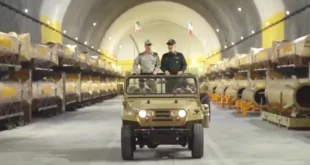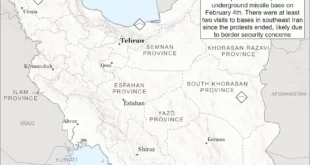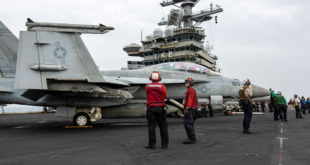 Despite chummy embraces and warm words, the leaders of Russia and France could not agree on one of the diplomatic world’s most pressing questions, whether or not Iran’s nuclear program would remain peaceful. Russian President Vladimir Putin said Iran must be encouraged to make its nuclear program fully transparent, but he also said there is no proof that Tehran is seeking to build atomic weapons.
Despite chummy embraces and warm words, the leaders of Russia and France could not agree on one of the diplomatic world’s most pressing questions, whether or not Iran’s nuclear program would remain peaceful. Russian President Vladimir Putin said Iran must be encouraged to make its nuclear program fully transparent, but he also said there is no proof that Tehran is seeking to build atomic weapons.
With no “objective data” showing Iran is working on nuclear arms, “we proceed from an assumption that Iran has no such plans,” Putin said after his talks with French President Nicolas Sarkozy, which followed a dinner Tuesday night at the Russian’s country residence.
Sarkozy, who is seeking to ratchet up international pressure on the Tehran, expressed hope that Putin’s visit to Iran next week would help make Iranian leaders more inclined to meet West’s demands.
“What’s very important is the willingness to cooperate, that’s the essential point. This is an issue that concerns the planet,” Sarkozy claimed.
The United States and its allies say Iran’s nuclear program is geared toward creating fissile material for atomic warheads. Tehran denies that, insisting its program is strictly for producing radioactive fuel for nuclear reactors that will generate electricity.
Washington and its allies have never presented any corroborative evidence to substantiate its allegations about Iran.
The UN nuclear watchdog, the International Atomic Energy Agency in Vienna, Austria, says it has not detected signs of a weapons program in Iran.
“We have not seen any weaponization of their program, nor have we received any information to that effect, no smoking gun or information from intelligence,” IAEA chief Mohamed ElBaradei said earlier this year.
Russia has opposed a push by the US, France and Britain for tougher sanctions against Iran, saying it will base its policies on the IAEA’s findings rather than Western accusations.
“We share our partners’ concern about making all Iranian programs transparent,” Putin said, but he added that Iran has already shown an increased readiness to do so.
“We agreed yesterday, and Mr. President (Sarkozy) confirmed it, that Iran is making certain steps toward the international community to achieve that,” Putin said.
In Washington, State Department spokesman Sean McCormack said the United States considered Russia to be on the same page with the West in terms of Iran’s nuclear program, even if there are “some tactical differences.”
He noted that senior diplomats from the five permanent members of the UN Security Council and Germany would meet next week in Europe for further consultations on a new sanctions resolution.
The group agreed last month to work out the text of a new resolution that would be presented for a vote in November if there is no progress in getting Iran to suspend enrichment and cooperate fully with the IAEA.
Sarkozy has taken a tough line toward Russia, accusing it of “brutality” in the use of oil and natural gas sales as a weapon and courting central and eastern European leaders who have bristled at Moscow’s efforts to renew its influence in former Soviet bloc areas.
But on his first presidential visit to Russia, Sarkozy struck a decidedly upbeat note after hours of talks with Putin on a battery of touchy subjects.
Sarkozy pointed at the opportunities of bilateral cooperation in such areas as space and nuclear energy and added that France wants to be a “privileged partner of Russia.” Touching on France’s presidency in the European Union next year, he said Russia and Europe are “natural partners.”
Speaking after the talks with Putin, Sarkozy called for transparency and respect for free-market rules in the bilateral economic ties and promised to take a nondiscriminatory attitude toward Russian companies willing to purchase assets in France.
 Eurasia Press & News
Eurasia Press & News



